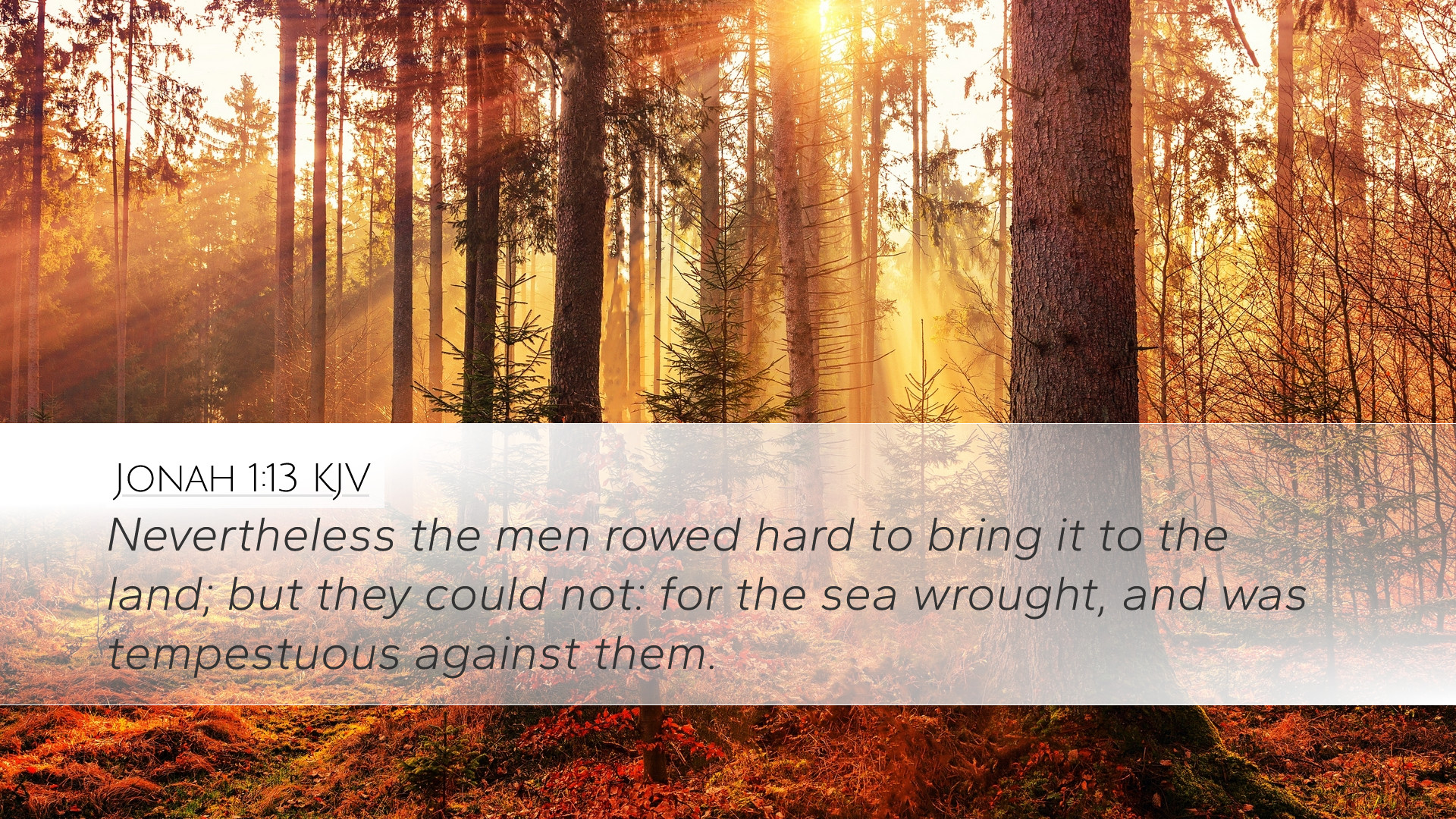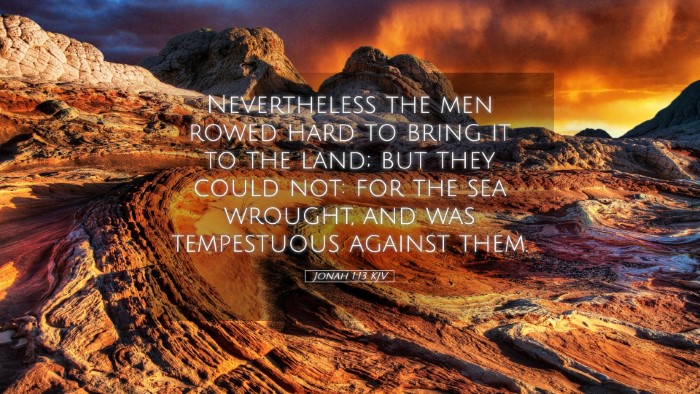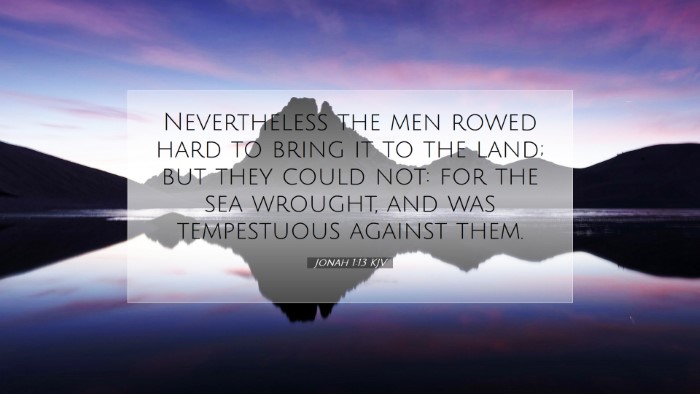Old Testament
Genesis Exodus Leviticus Numbers Deuteronomy Joshua Judges Ruth 1 Samuel 2 Samuel 1 Kings 2 Kings 1 Chronicles 2 Chronicles Ezra Nehemiah Esther Job Psalms Proverbs Ecclesiastes Song of Solomon Isaiah Jeremiah Lamentations Ezekiel Daniel Hosea Joel Amos Obadiah Jonah Micah Nahum Habakkuk Zephaniah Haggai Zechariah MalachiJonah 1:13
Jonah 1:13 KJV
Nevertheless the men rowed hard to bring it to the land; but they could not: for the sea wrought, and was tempestuous against them.
Jonah 1:13 Bible Commentary
Commentary on Jonah 1:13
Text of the Verse: "Nevertheless the men rowed hard to bring it to the land; but they could not: for the sea wrought, and was tempestuous against them."
Introduction
This verse from the book of Jonah depicts a crucial moment in the narrative, where sailors attempt to avert disaster despite the dire circumstances surrounding them. The determination of the sailors to row back to shore reflects the universal human desire to control one's destiny and the struggle against external forces.
Exegesis of the Verse
The urgency in this verse conveys a deep-seated conflict between divine will and human action. The men’s efforts to row hard symbolize both their physical struggle and their spiritual endeavor to escape the consequences of Jonah’s flight from God.
1. The Actions of the Sailors
The relentless rowing represents a profound aspect of human nature: the efforts to solve problems through personal strength and ingenuity. However, the sailors ultimately learn that their abilities are limited when faced with the uncontrollable forces of nature.
- Human Determination: The sailors' attempts to reach land highlight their resolve. In their desperate situation, they embody a climactic moment where human effort is contrasted against divine intervention.
- Failing Against Nature: Their inability to bring the ship to safety reflects the futility of relying on human effort alone in the face of divine will.
2. Theological Implications
In the broader context of Jonah’s narrative, this moment signifies the struggle between God’s sovereign plan and human rebellion. Jonah’s attempt to flee from God presents a theological conundrum: can one truly escape the presence and plan of God?
- Divine Sovereignty: This passage asserts God's authority over nature, demonstrating that even the most vigorous human efforts cannot thwart His divine purposes.
- Understanding Grace: The sailors’ desperate actions can also be seen as a precursor to their eventual repentance and acknowledgment of God’s power.
3. The Struggle and Consequences of Sin
The tempestuous sea serves as a symbol of turmoil that arises from disobedience. Jonah's flight leads not only to his own peril but also jeopardizes the lives of those aboard the ship.
- Consequences of Disobedience: The struggle of the sailors underscores the broader implications of one person's rebellion against God. It illustrates the ripple effects of sin, affecting not only the sinner but also the innocent.
- Call to Repentance: This moment serves as a divine call for Jonah—and later the sailors—to recognize their need for repentance and restoration.
Insights from Commentaries
Matthew Henry
Matthew Henry emphasizes the futility of their efforts, interpreting their rowing as a display of human endeavor against divine decree. He notes that the sailors’ attempts symbolize the human inclination to rely on one's abilities rather than seeking divine assistance. Henry points out that when God is determined to work out His purposes, all human strength is in vain.
Albert Barnes
Albert Barnes offers a theological reflection on the nature of the storm and its symbolic representation of God’s judgment. He elucidates how the storm not only acts as a physical barrier but also as a moral reflection of Jonah's disobedience. He adds that the sailors’ strong exertions to return to land signify an awakening recognition of the divine powers at play and their own helplessness.
Adam Clarke
Adam Clarke presents a view on the sailors' characterization, highlighting their bravery and determination amidst fear. Clarke notes that their efforts are admirable; however, he emphasizes the ultimate lesson: divine control prevails over human ambition. He suggests that Clarke sees this narrative as a broader reflection on human vulnerability in the face of divine providence.
Conclusion
Jonah 1:13 serves as a potent reminder of the limitations of human effort when confronted by divine will. The struggle of the sailors illustrates the universal theme of seeking control in chaotic circumstances while ultimately pointing to the necessity of recognizing God's sovereignty. The collective insights from various commentaries help in understanding not only the immediate narrative but also the profound theological truths that echo across the ages.
Pastors, students, theologians, and Bible scholars can glean a rich tapestry of lessons from this passage, encouraging a reliance on God's guidance and acknowledgment of the limitations of human strength in the pursuit of divine purposes.


